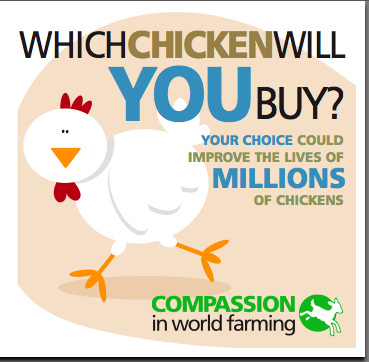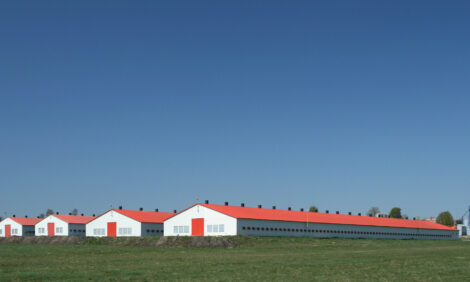



Sainsbury's backtracks on chicken welfare
Compassion in World Farming is extremely disappointed to announce that almost eight years after awarding Sainsbury’s with their Good Chicken Award, the retailer has failed to achieve its higher welfare commitments and has formally withdrawn from the awardFollowing a period of increased public awareness around the welfare of chickens reared for meat, Compassion launched the Good Chicken Award in 2010 to publicly recognise those companies committing to use higher welfare chicken. Sainsbury’s, along with Waitrose, M&S and the Co-op were the first UK retailers to receive the Good Chicken Award in 2010. Sainsbury’s also received Compassion’s ‘Best Volume Supermarket’ award in the same year and was quick to publicise its success. It regarded itself as ‘the country’s number one supermarket for animal welfare’ selling more RSPCA Assured (previously Freedom-Food approved) chicken than any other retailer.
Sainsbury’s had committed, for all of its fresh, own-label chicken, to provide more space for chickens to live (moving from a stocking density of 38kg/m² down to 30kg/m²), to provide the birds with natural light and enrichment such as straw bales for them to peck at and perch on, and to move to a slower growing breed of bird.
Company commitments under Compassion’s Good Farm Animal Welfare Awards should be met within five years. Unfortunately, Sainsbury’s has achieved low conversion on its Good Chicken Award commitments since 2010 and has therefore failed to deliver on its promise.
Today, less than 20 percent of Sainsbury’s fresh chicken is reared to higher welfare standards while most of the chicken it sells is still standard chicken with the associated welfare issues.
Introducing higher welfare standards into a business does require investment, which is often cited as the reason that companies are forced to abandon their higher welfare ambitions. However, higher welfare should not just be for the good times, but for the bad times too, and many Good Chicken Award winners, such as Waitrose and M&S, remain true to their word today and are bearing the costs to advance chicken welfare across their businesses.
In the US, over 80 companies (including Subway, Burger King and Kraft Heinz) have made 2024 commitments to further improve the lives of broiler chickens by tackling the fundamental problems of fast growing breeds and overcrowding in relatively barren environments, alongside the need for humane slaughter and third-party auditing.

Similarly, in Europe, M&S, Unilever and Elior Group have also signed up to the new EU Broiler Welfare criteria promising to achieve their aims by 2026. For M&S that means expanding its higher welfare chicken across its entire fresh and ingredient chicken supply, for Unilever, that means higher welfare chicken in all its bouillons and soups - a truly phenomenal commitment given that the chicken is for ingredients in products where its power in the supply chain is limited, and finally, Elior Group has committed to using higher welfare chicken GLOBALLY.
These examples put into perspective Sainsbury’s failure to achieve higher welfare across just its fresh chicken supply. Surely this is something within the realms of possibility for a company of Sainsbury’s stature, and from one that claims that treating animals well is ‘the right thing to do’ and promises to source ‘with integrity’.
For some years, the UK has been regarded as leading the way in higher animal welfare, but as leading UK retailers like Sainsbury’s backtrack on their welfare commitments, when so many US companies are advancing theirs, it shows that animal welfare could be slipping down the agenda this side of the pond.
Like any other business decision, commitments on animal welfare should be made for the long term, embedded into a public facing policy and supported at all company levels to ensure they can be achieved. Companies need to invest in production systems that are fit for purpose to ensure that the animals experience a good quality of life, and fit for the future too by meeting the growing demand for more ethical and sustainable food.
Higher welfare production may cost more but savings can be made – for example significantly fewer antibiotics are used when robust, slower growing breeds are reared, and there are fewer economic losses associated with meat quality issues. In addition, there are health benefits for chickens and humans alike, when higher welfare standards are implemented.
"Sainsbury’s is falling behind the curve"
Compassion advocates that we should all eat less meat, waste less and ensure that what we do eat has higher welfare origins if we are to truly value the lives of the animals reared to feed us and to support sustainable food production. Many consumers are already responding to this call by turning to more flexitarian diets where they eat meat less often. Compassion believes this will ultimately lead to a greater demand for higher welfare meat and retailers will need to keep up with this growing demand.
Compassion’s Director of Food Business, Dr Tracey Jones: “It’s extremely disappointing to see Sainsbury’s backtrack on its higher welfare commitments when other companies, like M&S, are committing to advance their chicken standards even further. We expect a leading UK retailer like Sainsbury’s who ‘knows that animal health and welfare matters’ to its customers to be at the forefront of the growing movement for higher welfare chicken.
“By not delivering on its welfare commitments – and in fact by completely withdrawing from them – Sainsbury’s is falling behind the curve and not only letting the chickens and its customers down but itself down too.”
As reported by CIWF









